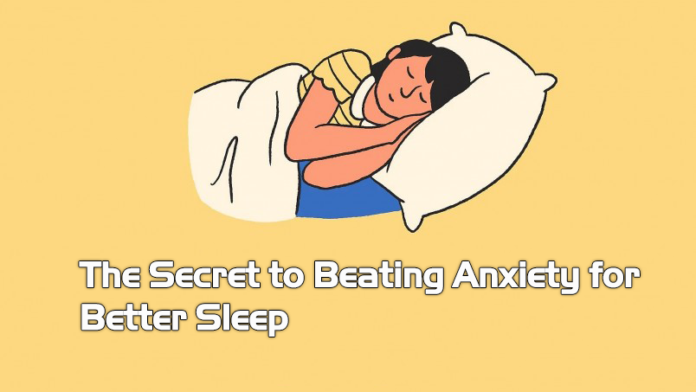As twilight descends and the world quiets, a relentless hum often fills the mind—a whirlwind of thoughts, worries, and the heavy shadow of anxiety. For those who grapple with its weight, sleep can feel like a distant mirage, shimmering just out of reach. But the secret to beating anxiety for better sleep lies not in battling it head-on, but in befriending stillness and reclaiming the rhythm of rest.
Anxiety thrives in the unguarded moments of solitude, magnifying uncertainties and conjuring scenarios that may never come to pass. Yet, like a fire needing fuel, it requires attention to grow. The first step, then, is to gently shift focus. Instead of wrestling with the thoughts that intrude, acknowledge them as passing clouds—ephemeral, harmless, and incapable of permanence. Whisper to yourself: This is temporary. I am safe.
Breath becomes the anchor in this storm. Deep, deliberate inhalations—counting slowly to four—followed by even slower exhalations, signal the body that it is time to let go. This rhythmic flow of air slows a racing heart and tames a restless mind. It is not merely breathing; it is a conversation with your inner self, a reminder that peace is always within reach.
Creating a sanctuary for sleep is another piece of the puzzle. Let your bedroom become a haven, a space that invites rest rather than rumination. Dim the lights, let the coolness of fresh linens embrace you, and banish the glow of screens that trick your brain into wakefulness. Engage the senses: a soft lavender scent, the whisper of a fan, or the gentle hum of white noise. These small rituals become an invitation, coaxing your body into a state of readiness for sleep.
Yet, the most profound secret lies in acceptance. Anxiety, like the ocean’s tide, ebbs and flows. Resisting it only amplifies its strength, while acceptance allows it to pass. Let go of the need for perfection; sleep, much like life, cannot be forced. Replace frustration with kindness, and trust that even the restless nights have value—they are moments to practice patience and self-compassion.
When the mind is kindled with gratitude, it leaves little room for fear. Reflect on small joys: the warmth of a loved one’s smile, the softness of a pet’s fur, or the stillness of the night itself. Gratitude reframes the narrative, reminding you that amidst anxiety, there is also beauty, and beauty soothes the soul.
The secret to beating anxiety for better sleep is not a single act but a mosaic of gentle practices. It is learning to quiet the mind, nurture the body, and trust that rest will come. With patience, perseverance, and love for oneself, even the most anxious nights can yield to the promise of dawn—and with it, the renewal of strength.
Part 1: Sleep and Stress – An Unexpected Connection

What Is Sleep and Why Is It Important?
Sleep is a natural and essential process for the body and mind, allowing us to recharge and maintain optimal health. The sleep cycle consists of several stages, including light sleep, deep sleep, and rapid eye movement (REM) sleep, each playing a crucial role in our well-being.
- Deep Sleep: Supports physical recovery, muscle repair, and immune system function.
- REM Sleep: Helps process emotions, consolidate memories, and enhance learning.
For example, athletes rely on deep sleep to recover from physical exertion, while students need REM sleep to retain what they’ve studied.
How Stress Affects Sleep
Stress disrupts sleep primarily through the action of the stress hormone cortisol. When we experience stress, the hypothalamus-pituitary-adrenal (HPA) axis is activated, increasing cortisol levels. Elevated cortisol can interfere with the natural decline in body temperature and heart rate needed to initiate sleep.
- Example: Persistent stress can cause you to toss and turn at night, delaying sleep onset. Even if you fall asleep, you may wake frequently, especially in the early morning hours.
Signs of Stress-Related Sleep Issues
Recognizing the symptoms of stress-induced sleep disturbances is crucial:
- Difficulty falling or staying asleep
- Light, restless sleep
- Daytime fatigue and irritability
- Waking up at specific times (e.g., 3 AM) and being unable to go back to sleep
- Poor concentration and feelings of unease
For instance, if you’re frequently waking up anxious and checking the clock, it may indicate stress is impacting your sleep cycle.
Part 2: Secrets to Reducing Stress for Better Sleep
Lifestyle Changes to Reduce Stress
Nutrition
Your diet plays a significant role in stress and sleep management. Avoid stimulants like caffeine, alcohol, and sugary foods in the evening. Instead, opt for foods rich in tryptophan, an amino acid that promotes the production of serotonin and melatonin.
- Example: Drinking a warm glass of milk with honey or eating a banana before bed can help induce relaxation and sleepiness.
Exercise
Regular physical activity reduces stress hormones and enhances sleep quality. However, timing is important—avoid intense workouts close to bedtime.
- Example: A morning yoga session or an evening walk can improve both mood and sleep.
Time Management
Learning to manage your schedule effectively can reduce stress. Plan your tasks realistically, and don’t hesitate to decline overwhelming responsibilities.
- Example: Reserve 30 minutes before bed to unwind with calming activities like reading or meditating.
Relaxation Techniques
Deep Breathing
Controlled breathing exercises, such as inhaling for four counts and exhaling for six counts, can lower your heart rate and stress levels.
Meditation
Focus on your breath or a calming mantra to shift your attention away from anxious thoughts.
Yoga
Certain yoga poses, such as Child’s Pose or Legs-Up-The-Wall, can release tension and prepare your body for rest.
Warm Baths
A warm bath 1-2 hours before bed can relax muscles and signal your body to prepare for sleep.
Creating the Ideal Sleep Environment
Bedroom Setup
Keep your bedroom minimalistic, quiet, and cool. Invest in comfortable mattresses and pillows tailored to your needs.
Lighting
Reduce blue light exposure from screens at least an hour before bed. Opt for warm, dim lighting instead.
- Example: Use a bedside lamp with soft, amber light and switch off electronic devices to create a calming ambiance.
Part 3: Additional Methods to Improve Sleep

Relaxing Bedtime Activities
Engage in calming activities like reading, listening to soothing music, or journaling. These habits signal your brain that it’s time to wind down.
Reframing Negative Thoughts
Challenge and replace worry-filled thoughts with positive affirmations or solutions.
- Example: Instead of dwelling on “I’ll never finish this project,” think, “I’ll do my best tomorrow with a fresh start.”
Seeking Support
Sometimes, sharing your concerns with a trusted friend, family member, or therapist can provide relief.
Complementary Therapies
Explore techniques like aromatherapy (e.g., lavender essential oil) or music therapy to create a relaxing bedtime ritual.
Sleep and stress are intricately connected, with stress often being the culprit behind restless nights. By understanding how stress impacts your sleep cycle and implementing practical strategies—such as lifestyle changes, relaxation techniques, and creating a calming environment—you can break the cycle and achieve restful, rejuvenating sleep.
Patience and consistency are key. Building new habits takes time, but the reward is worth it: a healthier mind, body, and outlook on life. Sweet dreams await!



